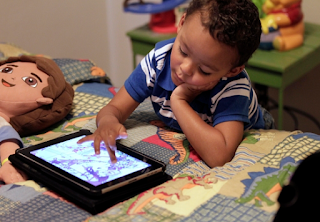10 tips for parenting in the digital age - For
years, the recommendation of the American Academy of Pediatrics (AAP)
when it comes to media and children was quite simple: limit TV to two
hours a day, and do not let children under 2 watch.
As the Internet has grown and new devices arrived, the recommendation
was set at two hours of "entertainment media" with the recommendation
that the screen without the stay of children under 2 crowd.
But these days, even that got hard. He made a math game in iPad entertainment? How the rule is two hours if your child is checked intermittently media while doing homework online? What
about text messages - that is the media and on the basis of the screen,
but a large part is the conversations between friends, rather than
attaching the home phone for hours, like teenagers used to do.
And
if you let your child watch a video on your phone to silence them on a
bus full of people (so that you do not get the evil eye from everyone
around you), is that terrible?
Our children are growing up in the digital age, and parenthood should reflect that. The AAP understands this and works hard to understand the current research on media effects on children, in order to give the best advice to parents. Meanwhile, they have released Ten tips for parents in the digital era:
1. Treat the media as you would for any other environment in your child's life. Want
to know what their children are doing in school and with friends - you
should want to know what they are doing online, too. And as you have rules on behavior at school and with friends, you should have rules of life online.
2. Set limits and encourage recreation. The AAP recommends establishing "reasonable limits" for media use, which vary with the child and the situation. It is also important that children have a lot of time away from the
media, using their brains and bodies in different ways and the
interaction with the three-dimensional world around them.
3. Families that play together learn together. This
is especially important for young children - if you let them use the
media, to do with them so they can come and go, which is so crucial to
the early development of the brain. And instead of using the media as a babysitter, they use it as a way to have fun together.
4. Be a good role model. If you are on your phone or laptop at any time, or turn the TV as soon as you sit on the couch, what kind of message do we send?
5. Knowing the value of the communication face-to-face. It is not only crucial to the developing brains of infants, it is crucial for relationships and mental health. The media can sometimes help with this, as with video chat with
distant relatives, but for most, the house take is: everybody must end
devices and talk to each other on a regular basis.
6. Creating the ALE technology. Sometimes
technology can really get in the way - relations (so that the dinner
table is a good place for a free technology zone) or sleep (which is
becoming a big problem with teenagers - The phone should be charged outside the room). It is also a safety issue: texting while driving (or walking in the street) can be fatal.
7. Do not use technology as an emotional pacifier. Yes, it may be useful to the child in the crowded bus. But children also need to learn to manage emotions - and boredom - without the help of a device. It is an essential skill.
8. Do your homework when it comes to applications for children. They are definitely not all the same. An excellent resource is Common Sense Media, which examined
applications and all sorts of other media such as movies and TV shows.
9. It's good for her teenage son to be online. It is really where teenagers are connected these days, and it's not a good idea to keep them out. However,
they must learn to be good and responsible digital citizens: Not many
activities online and offline time relationships; they need to be friendly; and they should remember that everything they do online is truly private - and all you do is potentially permanent.
10. Children can make mistakes. Because what kids do. They fall kick the ball into the goal of the opposing team, the rules are broken, hurt feelings. They can make mistakes online, too. The AAP recommends errors trying to approach with empathy, and turn them into moments conducive to learning. But if the "errors" continue, especially if you have concerns about bullying, sexting, or signs of depression, tell your doctor.
AAP has many great resources to help families make healthy choices of communication - such as the Center on Media and Child Health at Boston Children's Hospital.
By: Claire McCarthy,MD
1/05/2016
Home »
Child health.
,
Child Protection
,
News Children
,
Teen Health
» 10 tips for parenting in the digital age













0 komentar:
Post a Comment
"Thank you for visiting my blog, please leave a comment in the space provided."